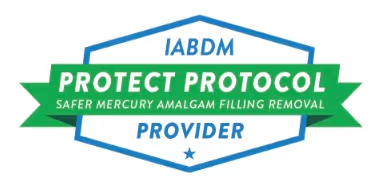What is a Periodontal Exam?
"Peri" means "Around". "Odontal" means tooth. So it is the examination of the structures surrounding your teeth. Meaning your gums and bone. A periodontal exam measures 6 separate spots on each tooth to see the condition of the gum and bone surrounding the tooth. These exams help us to determine the TYPE of cleaning a person needs. 75% of dentists don't check periodontal pockets. 75% of people have gum disease. You do the math! So our office has committed to ensuring we measure and diagnose properly, to best serve our patients.
Why is a periodontal exam necessary?
Periodontal exams are necessary to determine the kind of cleaning you will need. If your exam is clean and there are no sites of concern, then you can get a regular cleaning and polishing, also known as a "prophy" or "prophylaxis". We use fluoride free polishing paste for our patients. If, however, your periodontal exam indicates areas of inflammation or bone loss, then you may need more advanced and extensive types of treatments, such as Scaling and Root Planing, and even potentially PRF (Platelet Rich Fibrin) Grafting. It is important to identify these issues, because gum disease, heart disease, diabetes and stroke are intimately and intricately linked. There is even evidence that lung and pancreatic cancer are linked to periodontal disease!
How often should a person get their teeth cleaned?
If you have simple dental needs and very little or no inflammation, we recommend a cleaning every 6 months. We recommend seeing children as soon as they turn one year old, but if they have a lip or tongue tie, we ask to see them within a couple of days or weeks of birth, to assess if the ties are interfering with the breastfeeding relationship. If you have more extensive periodontal needs, we are happy to help! If it's been a long time since your last cleaning, it's never too late to start loving your smile. We offer care in a judgement-free and relaxed manner.
.avif)
.avif)
Our New Patient Process:
Our new patient process is quite different than conventional offices!
1st appointment: Our dental hygienist or assistant takes a CBCT and X-rays of our patients’ mouth. At that appointment, they also take full mouth photographs, and chart the existing restorations in the mouth. If the dental hygienist is doing the records appointment, she is also doing full mouth probing and a review of the health history to determine if we also need to recommend a sleep study to screen for sleep disordered breathing. This appointment takes about 90 minutes. We do it in this order because the naturopath we refer to for meridian stress assessments (MSA) needs the image we get from the CBCT to be able to do the MSA.
2nd Appointment: One of our team members does biocompatibility testing on our new patient, and a "mini" meridian stress assessment that tells us if there are areas of concern that require a consultation with our naturopath for a more extensive MSA. Sometimes we have to do emergency treatment, and she will do that testing immediately prior to the treatment appointment, so that we know what materials to use. But if there is a concern with multiple areas, we will send our patient to the naturopath to get that testing done. They may also be asked to complete a sleep study if they have a history of grinding, clenching, gritting, headaches, root canals, implants, popping/clicking of the jaw, hypothyroidism, mood or hormonal disorders, hypertension or diabetes.
3rd appointment: This is where our doctors not only do their diagnostic process, but also build their relationships with our new patients. (I’m going into the third person mode here because there is more than one doctor in our office). Dr. Scott or Dr. Perry review the medical history and go over the CBCT and X-rays with the patient. Then they review the meridian stress assessment and compatibility testing, and if we have the report from their sleep study from the board certified sleep medicine specialist, they go over that as well. Finally, they look in the patient’s mouth and do the diagnostic process of the exam to determine need for periodontal treatment, fillings, extractions, crowns, oral cancer screen, airway assessment, frenulum assessment, etc. It’s quite an exhaustive list of things they look at. If there are abscessed teeth, they discuss all of the options. If there are amalgams that are of concern, they discuss the safe removal process we use in our office. If there are missing teeth, they discuss all of the replacement options.
After that, we have an honest discussion with our patients about what their wants and needs are from us - some people only want to fix what is obviously broken and some want to play the wait and see option, and others want to find and fix everything we can help with. They also answer any questions a patient may have. This appointment may be 60-90 minutes in length.
As you can see, those data collection things we do between the first and second appointments are super useful in our diagnostic process. We are an office that believes that measured MATTERS. So we evaluate a BUNCH of different things, because it aids in that comprehensive evaluation. I hope this serves to help you understand both why we do our new patient process the way we do it, AND why we recommend the EAV and sleep testing for our patients to ensure we don’t miss anything. We see it as our checks and balances. We have no desire to do unnecessary work. The testing ensures we are thorough without trying to do work that isn’t needed.
If you think you might benefit from a Periodontal Exam, call our office today so that one of our helpful staff members can further assist you.








